虚拟语气
虚拟语气的常见用法和形式
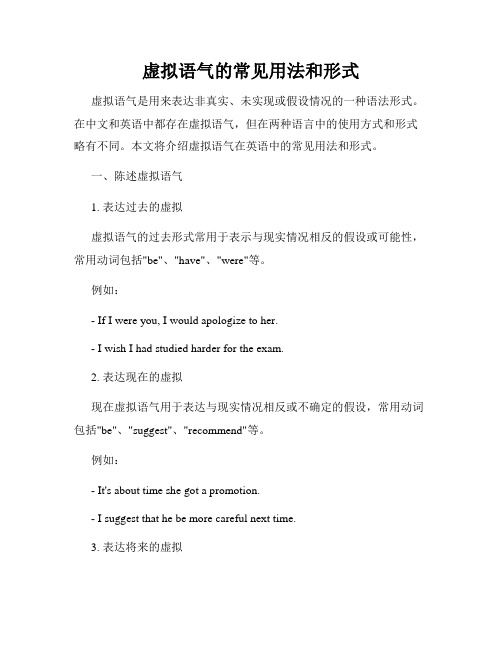
虚拟语气的常见用法和形式虚拟语气是用来表达非真实、未实现或假设情况的一种语法形式。
在中文和英语中都存在虚拟语气,但在两种语言中的使用方式和形式略有不同。
本文将介绍虚拟语气在英语中的常见用法和形式。
一、陈述虚拟语气1. 表达过去的虚拟虚拟语气的过去形式常用于表示与现实情况相反的假设或可能性,常用动词包括"be"、"have"、"were"等。
例如:- If I were you, I would apologize to her.- I wish I had studied harder for the exam.2. 表达现在的虚拟现在虚拟语气用于表达与现实情况相反或不确定的假设,常用动词包括"be"、"suggest"、"recommend"等。
例如:- It's about time she got a promotion.- I suggest that he be more careful next time.3. 表达将来的虚拟将来虚拟语气用于表达与现实情况相反或不可能实现的假设,常用动词包括"should"、"were to"等。
例如:- If I should win the lottery, I would buy a big house.- If it were to rain, the event would be canceled.二、命令虚拟语气当表示一种命令、建议或要求时,常使用虚拟语气来显得客气或委婉。
例如:- I suggest that you arrive on time for the meeting.- It's important that he be there for the ceremony.三、愿望虚拟语气愿望虚拟语气用于表达对过去、现在或将来的愿望、期望或希望。
虚拟语气用法归纳表格
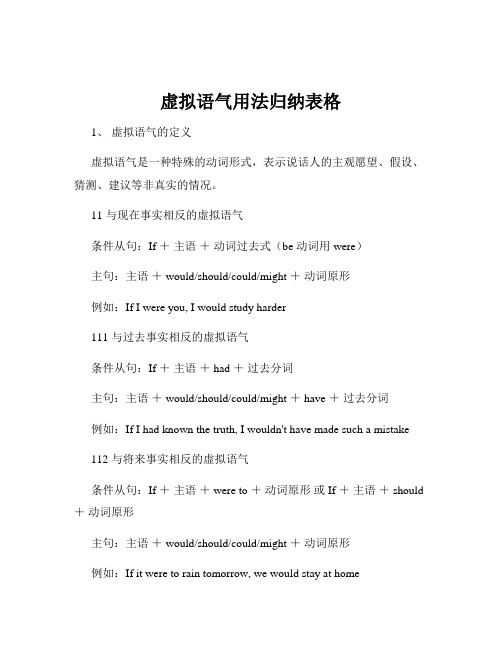
虚拟语气用法归纳表格1、虚拟语气的定义虚拟语气是一种特殊的动词形式,表示说话人的主观愿望、假设、猜测、建议等非真实的情况。
11 与现在事实相反的虚拟语气条件从句:If +主语+动词过去式(be 动词用 were)主句:主语+ would/should/could/might +动词原形例如:If I were you, I would study harder111 与过去事实相反的虚拟语气条件从句:If +主语+ had +过去分词主句:主语+ would/should/could/might + have +过去分词例如:If I had known the truth, I wouldn't have made such a mistake 112 与将来事实相反的虚拟语气条件从句:If +主语+ were to +动词原形或 If +主语+ should +动词原形主句:主语+ would/should/could/might +动词原形例如:If it were to rain tomorrow, we would stay at home121 wish 后的宾语从句与现在事实相反:从句用一般过去时与过去事实相反:从句用过去完成时与将来事实相反:从句用 would/could +动词原形例如:I wish I were a bird (与现在事实相反)122 would rather 后的宾语从句与现在或将来事实相反:从句用一般过去时与过去事实相反:从句用过去完成时例如:I would rather you came tomorrow (与将来事实相反)13 虚拟语气在主语从句中的应用It is +形容词+ that 句型中,形容词为 necessary, important, strange 等时,从句用“should +动词原形”,should 可以省略。
例如:It is necessary that we (should) study hard14 虚拟语气在表语从句和同位语从句中的应用与主语从句类似,在 suggestion, proposal, order 等名词后的表语从句和同位语从句中,从句用“should +动词原形”,should 可以省略。
虚拟语气用法总结

概念:谓语v用不同的形式表示说话人的不同意图,这 种形式称为语气。语气分三种: 1.陈述语气:用来陈述一个事实,或提出一种看法,有 肯定、否定、疑问、感叹等形式。
He is late for class. What fun!
He is not interested in classical music. 2.祈使语气:用来表示请求、邀请、命令、警告或劝告 等(动词常用原形) Don’t be late! 3.虚拟语气:表示说话人所说的不是事实,而是一种假 设、愿望、怀疑或推测。
2.If I were you, I would accept his advice. Were I you,……
3.If it rained/should rain/were to rain tomorrow, I would stay at home.
Should it rained tomorrow/ Were it to rain tomorrow,
(或用could have done) 与将来事实相反 could/would/might + do/be
I wish (that)he_w_o_u_ld_/_c_ou_l_d_/m__ig_h_t v_i_si(tvisit) us tomorrow.
I wish (that) he__v_i_si_te_d___(visit)us today. I wish he_h_a_d_v_i_si_t_ed__u_s/_c_o_u_l_d_h_a_v_e_v_is_i_te_d__u_s (visit) us yIfeosntelyrdyaoyu. __h_a_d_li_s_te_n_e_d___ (listen)to our advice!
虚拟语气大全
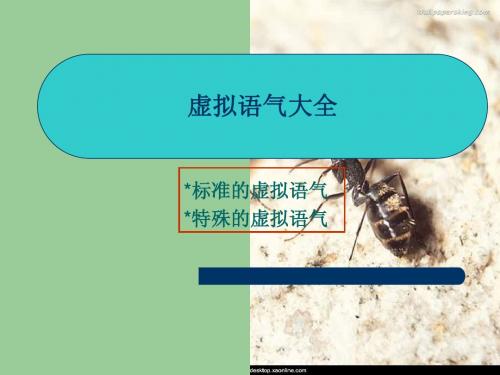
3. 含有were, had, should, could 的从句 省略if法 If I had a lot of money,
Had I a lot of money, If I would buy I could do this it, house. 如果我能做这件事情,我一定会做的。 Could do it, I would surely do it. IfI the Black Death should reappear , 万一黑死病再次出现,我们该怎么办? Should the Black Death reappear, what should we do?
有一些动词(表建议,命令,请求,要求)后 的从句
Ask, command, decide, demand, desire(希 望), insist, move(动议), order, direct(命令), propose, request, recommend(推荐,建议), suggest, urge(敦促), rule(裁定)…. 特别是说明:由这些动词演变过来的形容词和 名词后的从句的动词与这些动词后的从句谓语 动词用法一样。比如suggest 和suggestion 后的从句的动词都应该用(should) 动词原 型。
句型:it is + 一系列形容词和名词 + that …
-
一系列形容词和名词: important, desirable, necessary, essential, imperative, vital, natural, strange, incredible, my wish, a pity It is natural that mothers should love their children It is natural that mothers love their children (其中should可以省略)
虚拟语气讲解
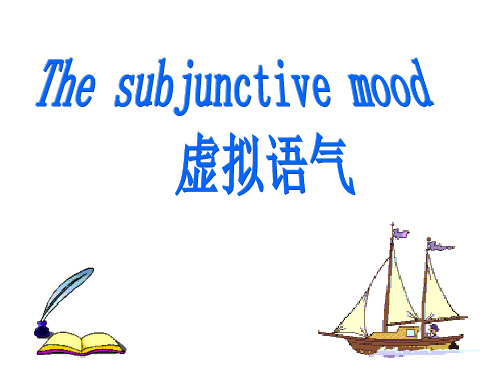
What would have happened, _____ as far as the river bank? (01 上海) A. Bob had walked farther B. if Bob should walk farther C. had Bob walked farther D. if Bob walked farther
C
二、虚拟语气在名词从句中的运用 (1)用于宾语从句 1、wish 后面的宾语从句中。 一般用虚拟语气,表示一种不可能实现的愿望。其谓 语动词形式为:
表现在
表过去
过去时
过去完成时
表将来 would, might, could+动词原形 I wish (that) I were a bird.
I wish (that) I had seen the film last night. I wish (that) I would\could go.
虚拟语气
虚拟语气的概念
虚拟语气是一种特殊的动词形式,一是用来
表示说话人所说的话不是一个事实,而是一 种假设、猜测、怀疑等(在条件从句中或让步 状语从句中);一是表示说话人的愿望、要求、 命令、建议等 (在宾语从句、表语从句、同位 语从句)。
虚拟语气在 在条件从句中
虚拟条件句
与现在 事实相 反的假 设 与过去 相反的 假设 与将来 相反的 假设
2. 在某些动词后的宾语从句中需用should+动词原形的 虚拟语气形式。“should”可以省略。 常见的动词有: 一个坚持insist; 两个命令order, command ; 三条建议suggest , advise, propose; 四项要求demand, request, require, ask; 另外还有prefer
虚拟语气

1.过去式 过去式 would/could/should 将来 2. should+ V.(原) 原 /might +V.(原) 原 3. were to do
4. It’s (about/high) time +that
过去时(did/were) 过去时 Should(不省) +V.
你该走了。 你该走了。
It’s high time that you went. It’s high time that you should go.
我们该去
It’s time that we went to bed.
★
现在: 现在:过去时 3. as if /though + 从句 过去: 过去: 过去完成时
★ ★
She loves the baby as if it were her own son. I remember the whole thing as if it had
happened yesterday.
3) What ____ last night if you ____ to do your B washing? A. would you do, hadn’t had B. would you have done, hadn’t had C. would you do, didn’t have D. would you have done, didn’t have 4) If I had hurried, the train ____ . D A. would catch C. had caught B. would have caught D. would have been caught
虚拟语气英语知识点总结

虚拟语气英语知识点总结一、虚拟语气的概念。
虚拟语气是一种特殊的动词形式,用来表示说话人所说的话不是一个事实,而是一种假设、愿望、怀疑、猜测或建议等。
二、虚拟语气在条件句中的用法。
1. 与现在事实相反的虚拟条件句。
- 结构:从句(If + 主语+ 动词的过去式(be动词一般用were)),主句(主语+ would/should/could/might+动词原形)。
- 例如:If I were you, I would study harder.(如果我是你,我会更努力学习。
实际上我不是你)2. 与过去事实相反的虚拟条件句。
- 结构:从句(If+主语+had+过去分词),主句(主语+would/should/could/might + have+过去分词)。
- 例如:If he had taken my advice, he would have passed the exam.(如果他听了我的建议,他就会通过考试了。
实际上他没听建议,也没通过考试)3. 与将来事实相反的虚拟条件句。
- 结构:从句(If+主语+动词的过去式/should+动词原形/were to+动词原形),主句(主语+would/should/could/might+动词原形)。
- 例如:If it rained tomorrow, we would stay at home.(如果明天下雨,我们就会待在家里。
明天是否下雨还不确定,但这是一种假设情况)- 或者If he should come tomorrow, I would tell him the news.(如果他明天来,我就会告诉他这个消息)- 以及If I were to see her tomorrow, I would give her the book.(如果我明天见到她,我就会把书给她)三、虚拟语气在宾语从句中的用法。
1. wish后的宾语从句。
- 表示与现在事实相反的愿望,从句谓语动词用过去式(be动词用were)。
虚拟语气
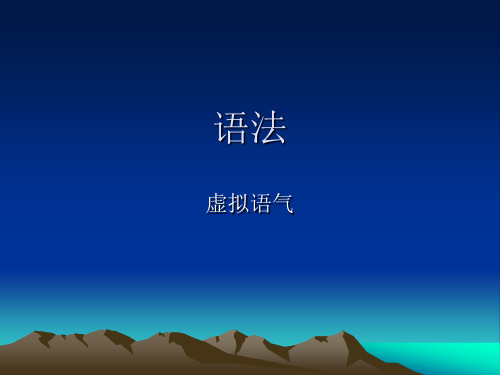
虚拟语气
何为虚拟语气?
• 虚拟语气是一种动词形式,表示说话人的 一种愿望、假设、怀疑、猜测、建议等含 义,它所表示的含义不是客观存在的事实。 如: • If I were you, I‘d take them away.如果我是 你的话,我就会带走他们。 • He suggested that our class should be divided into five groups.他建议说我们班应 该分为五个小组。
虚拟语气在状语从句中的用法
• •
• • •
A 在条件状语从句中的用法:虚拟语气在表示条件的状语从句中的使用最常见。
表示与现在事实相反的假设:若表示与现在事实相反的假设,条件从句用一般过去时, 主句中用“would/should/might+动词原形”的形式:If my brother were here, everything would be all right.要是我哥哥在这,一切都没有问题了。 表示与过去事实相反的假设:若表示与过去事实相反的假设,条件状语从句中用过去完 成时,主句中用谓语动词“should/would/could/might +have done”的形式:If I had set off a little earlier, I would have caught the train. 表示与将来事实相反的假设:若表示与将来事实的假设,条件状语从句中用一般过去时、 should+动词原形或were to+原形,主句中谓语动词用should/would/could/might+动词原形的形式: If it were fine tomorrow, I would go shopping.如果明天天气好,我就去买东西。 错综时间条件句:错综时间条件句指条件状语从句表示的动作发生的时间不一致,即条 件从句表示与过去事实相反,主句表示与现在事实相反;或条件从句表示与现在事实相反,主句表 示真实情况:If he had set out earlier, he would be home tomorrow.如果他早点出发的话,现在就 已经到家了。 含蓄条件句:有时为了表达的需要,在虚拟语气中并不总是出现if引导的条件句,而通 过其他手段如介词(短语)with ,without ,but for,副词otherwise,或其他从句来表示虚拟语气的条件: What should I do with a million dollars? 如果你有一百万美元,你会怎么做? We could not have finished the work ahead of time without your help.如果没有你的帮助,我们不会提前完成任务。 But for the rain, we could have held the sport meet.如果不是下雨的话,我们就开运动会了。
虚拟语气(经典)

⑦(2008·重庆一中)________ I had time,I would have
checked my answers again.
A.If
B.Unless
C.Had
D.When
解析:本题考查虚拟语气条件状语从句省略if时的倒装
(dǎo zhuānɡ)现象。
答案:C
精品PPT
⑧(2008·江 苏 兴 化 (xīnɡ huà))What would have happened,________,as far as the river bank?
精品PPT
Should there be a flood,what should we do?万一 (wànyī)发生洪水,我们怎么办?(=If there should be a flood)
Were he to come,I might go with him. 他若是来,我就可能跟他去。(=If he were to come)
would have met him. 要是你早来几分钟的话,你就能见到他了。
(与将来事实可能相反) 2. If it were sunny tomorrow, I would come to see
you. 明天要是天气(tiānqì)好的话,我来看你。
(与现在事实相反) 3. If I were you, I would go at once. 假如我是你的话,我会马上走。
精品PPT
5.错综时间条件句 当条件从句表示的动作和主句表示的动作 发生的时间不一致的时候(如一个发生在过去, 一个发生在现在),动词的形式(xíngshì)要根据 它所表示的时间来调整。例如: If he had listened to me,he would not be in trouble now.如果他当时听了我的话,现在 就不会遇到麻烦了。 If the weather had精品PbPT een more favorable,
虚拟语气总结

虚拟语气总结虚拟语气是英语语法中的一种特殊语态,用来表达一种假设、愿望、建议、命令、怀疑或可能性的情态。
在句子中,虚拟语气主要通过动词的形态变化和句子结构来表示。
一、虚拟语气的形态变化:1. 过去虚拟语气:主要用于表示与事实相反的情况或不可能实现的愿望。
形式为:had + 过去分词。
例如:“If I had enough money, I would travel around the world.”2. 现在虚拟语气:主要用于表示与现在事实相反的情况或不可能实现的愿望。
形式为:动词原形+过去式。
例如:“If I were you, I would study harder.”3. 条件句中的虚拟语气:主要用于表示条件句中的假设情况。
形式为:should/would/could/might + 动词原形。
例如:“If it should rain tomorrow, we would stay at home.”二、虚拟语气的用法:1. 表达与现在事实相反的情况:使用“were”作为虚拟语气动词,无论主语是单数还是复数。
例如:“If I were you, I would apologize.”2. 表达与过去事实相反的情况:使用“had”作为虚拟语气动词。
例如:“If I had studied harder, I would have passed the exam.”3. 表达不可能实现的愿望:使用虚拟语气动词的适当形式来表示愿望、建议或命令。
例如:“I wish I were taller.” “If only I could speak French.” “She demanded that he leave immediately.”4. 表达估计、推测、怀疑或建议:使用虚拟语气动词的适当形式来表示可能性。
例如:“It is important that he arrive on time.” “She suggested that we go to the cinema.”三、虚拟语气的注意事项:1. 注意一致性:在条件从句中,主句和从句的动词形式要保持一致。
(完整版)虚拟语气详解
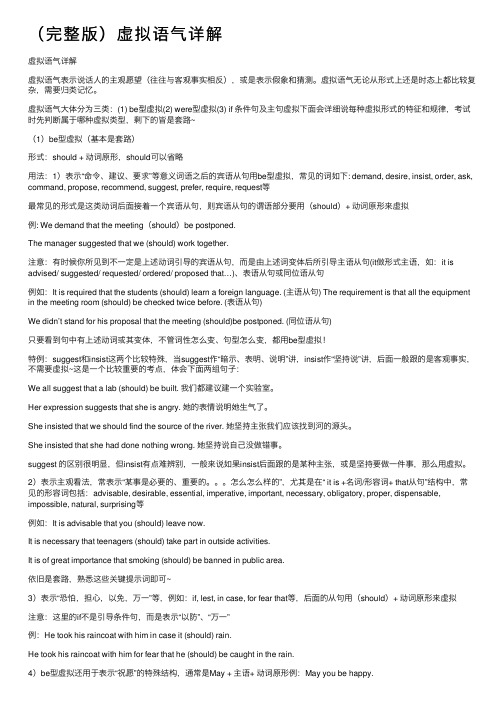
(完整版)虚拟语⽓详解虚拟语⽓详解虚拟语⽓表⽰说话⼈的主观愿望(往往与客观事实相反),或是表⽰假象和猜测。
虚拟语⽓⽆论从形式上还是时态上都⽐较复杂,需要归类记忆。
虚拟语⽓⼤体分为三类:(1) be型虚拟(2) were型虚拟(3) if 条件句及主句虚拟下⾯会详细说每种虚拟形式的特征和规律,考试时先判断属于哪种虚拟类型,剩下的皆是套路~(1)be型虚拟(基本是套路)形式:should + 动词原形,should可以省略⽤法:1)表⽰“命令、建议、要求”等意义词语之后的宾语从句⽤be型虚拟,常见的词如下: demand, desire, insist, order, ask, command, propose, recommend, suggest, prefer, require, request等最常见的形式是这类动词后⾯接着⼀个宾语从句,则宾语从句的谓语部分要⽤(should)+ 动词原形来虚拟例: We demand that the meeting(should)be postponed.The manager suggested that we (should) work together.注意:有时候你所见到不⼀定是上述动词引导的宾语从句,⽽是由上述词变体后所引导主语从句(it做形式主语,如:it is advised/ suggested/ requested/ ordered/ proposed that…)、表语从句或同位语从句例如:It is required that the students (should) learn a foreign language. (主语从句) The requirement is that all the equipment in the meeting room (should) be checked twice before. (表语从句)We didn’t stand for his proposal that the meeting (should)be postponed. (同位语从句)只要看到句中有上述动词或其变体,不管词性怎么变、句型怎么变,都⽤be型虚拟!特例:suggest和insist这两个⽐较特殊,当suggest作“暗⽰、表明、说明”讲,insist作“坚持说”讲,后⾯⼀般跟的是客观事实,不需要虚拟~这是⼀个⽐较重要的考点,体会下⾯两组句⼦:We all suggest that a lab (should) be built. 我们都建议建⼀个实验室。
虚拟语气
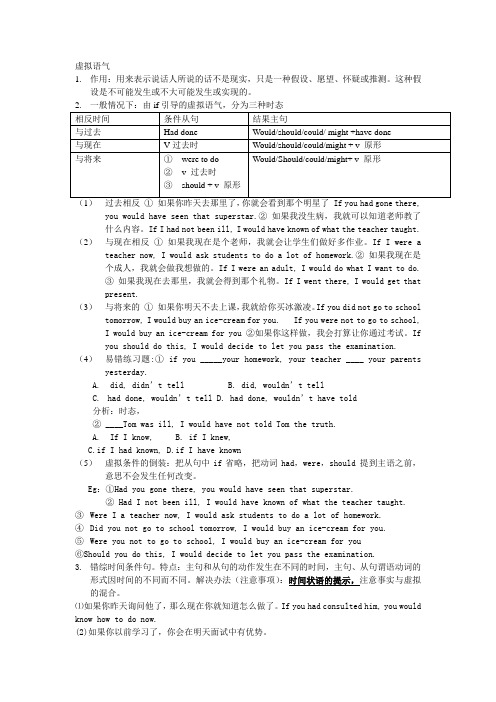
虚拟语气1.作用:用来表示说话人所说的话不是现实,只是一种假设、愿望、怀疑或推测。
这种假设是不可能发生或不大可能发生或实现的。
(1)过去相反①如果你昨天去那里了,你就会看到那个明星了 If you had gone there, you would have seen that superstar.②如果我没生病,我就可以知道老师教了什么内容。
If I had not been ill, I would have known of what the teacher taught.(2)与现在相反①如果我现在是个老师,我就会让学生们做好多作业。
If I were a teacher now, I would ask students to do a lot of homework.②如果我现在是个成人,我就会做我想做的。
If I were an adult, I would do what I want to do.③如果我现在去那里,我就会得到那个礼物。
If I went there, I would get thatpresent.(3)与将来的①如果你明天不去上课,我就给你买冰激凌。
If you did not go to school tomorrow, I would buy an ice-cream for you. If you were not to go to school,I would buy an ice-cream for you ②如果你这样做,我会打算让你通过考试。
Ifyou should do this, I would decide to let you pass the examination.(4)易错练习题:① if you _____your homework, your teacher ____ your parents yesterday.A.did, didn’t tellB. did, wouldn’t tellC.had done, wouldn’t tellD. had done, wouldn’t have told分析:时态,② ____Tom was ill, I would have not told Tom the truth.A.If I know,B. if I knew,C.if I had known,D.if I have known(5)虚拟条件的倒装:把从句中if省略,把动词had,were,should 提到主语之前,意思不会发生任何改变。
虚拟语气定义

It is the first that he have gone there.
It was the first time that he had gone there.
7. 在含有if it were not for 或if it had not been for 条件句的虚拟语气中. 如: If it were not for the rain, the crops would die. If it had not been for your help, we could not have finished the work ahead of time
虚拟语气定义
虚拟语气用来表示说话人的主观愿望或假 想,而不表示客观存在的事实,所说的是 一个条件,不一定是事实,或与事实相反。 虚拟语气通过谓语动词的特殊形式来表示。 虚拟语气常表示条件和结果的状语从句中。 在表示与事实相反的虚拟语气时动词有三 种时态:现在时,过去时,将来时。
should + 动词原形 此处的should 一般不省略
注意:
It is the first time that从句 现在完成时 It was the first time that从句 过去完成时
It is time for us to have dinner. It is (about/high) time that we had dinner.
8
if only 从句 if only 若是...那该多好啊; 真希望...; 只要...就好 过去完成时 对过去虚拟
could + 完成时
if only 一般过去时 对现在虚拟
would /could/might 对将来虚拟 +动词原形 1. If only Marx were still by my side to see this with his own eyes. 2. If only she could have lived a little longer.
虚拟语气用法

虚拟语气用法虚拟语气,又称“虚拟假设语气”,是指说话者或写作者在表达某种情况时,通过使用特定的语法形式来表示这种情况实际上并不存在或者与事实相反。
虚拟语气在英语中非常常见,它可以用来表达假设、愿望、建议、命令、推测等多种语境。
本文将介绍虚拟语气的各种用法及例句。
一、假设与现实相反的情况虚拟语气常用于表示与现实相反的情况或假设。
在这种情况下,谓语动词常以“would/could/should + 动词原形”或“were + 主语”等形式出现。
1. 虚拟语气用于假设:If I were rich, I would travel around the world.如果我有钱,我会环游世界。
If she had studied harder, she could have passed the exam.如果她学得更努力,她本来可以通过考试的。
2. 虚拟语气用于愿望:I wish I were taller.我希望我更高一些。
I wish you wouldn't be late for the meeting.我希望你不要迟到开会。
3. 虚拟语气用于建议:I suggest that he should see a doctor.我建议他去看医生。
It is recommended that every student study English.建议每个学生都学习英语。
二、与过去事实相反的情况虚拟语气还常用于表示与过去事实相反的情况。
在这种情况下,主要使用“had + 过去分词”形式或其他相应的虚拟语气结构。
1. 虚拟语气用于与过去事实相反的条件:If he had arrived earlier, he would have caught the train.如果他早点到,他就能赶上火车了。
If I had known you were coming, I would have prepared dinner.如果我知道你要来,我就会准备晚餐了。
虚拟语气
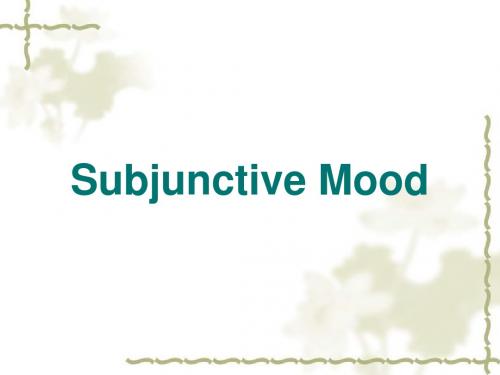
Should it rain tomorrow , we would stay at
home.
Had I had the money last year, I would
have bought thihe PLA,we wouldn‘t
have been able to beat the flood. 要不是人民解放军,我们是无法战胜洪水的。
2)对过去情况的假设:表示过去实际上并 没有发生或已经发生了的事情。其形式如下: If +主语+had +过去分词,主语+should (would, could, might) have+过去分词 例如: If I had not studied hard, I would have failed in the exam.
表示主观判断、推测、建议、 二. 表示主观判断、推测、建议、命令和要求
虚拟语气在表示要求、建议、命令等的从句中,其形式使 “should+动词原形”或省去should直接用动词原形。 1.用在宾语从句中,这样的词有advise(劝告)、ask(要求)、 decide(决定)、insist(坚持)、order(下令)、suggest(建 议) command(命令)、demand(要求)、desire(渴望)、 propose(提议)、recommend(劝告)、require(要求) consent(同意)、deserve(值得提起)、maintain(主张)、 move(提议)、urge(极力主张)、 vote(提议) 例如: He insisted that John (should) do the job. We suggested that the meeting (should) not be postponed. The union demanded the wages (should) be raised by 20% . 注:有时,上述动词所跟的宾语从句不是表示主张,建议或要求 等,而是其他的意义,这是则仍用陈述语气。例如: The expression on her face suggests that she knows the secret.
虚拟语气用法归纳
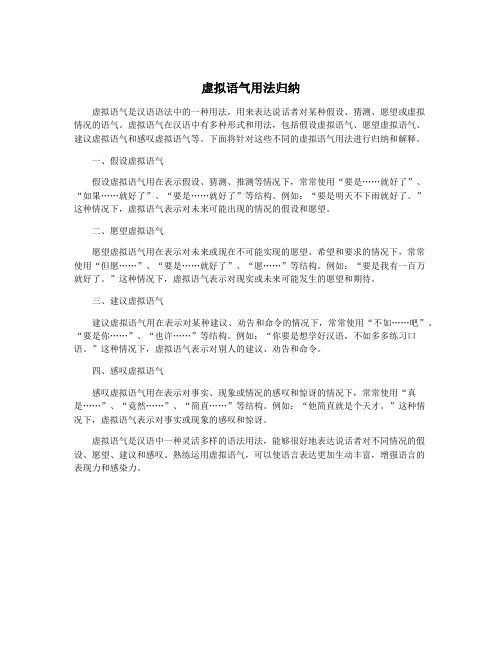
虚拟语气用法归纳虚拟语气是汉语语法中的一种用法,用来表达说话者对某种假设、猜测、愿望或虚拟情况的语气。
虚拟语气在汉语中有多种形式和用法,包括假设虚拟语气、愿望虚拟语气、建议虚拟语气和感叹虚拟语气等。
下面将针对这些不同的虚拟语气用法进行归纳和解释。
一、假设虚拟语气假设虚拟语气用在表示假设、猜测、推测等情况下,常常使用“要是……就好了”、“如果……就好了”、“要是……就好了”等结构。
例如:“要是明天不下雨就好了。
”这种情况下,虚拟语气表示对未来可能出现的情况的假设和愿望。
二、愿望虚拟语气愿望虚拟语气用在表示对未来或现在不可能实现的愿望、希望和要求的情况下,常常使用“但愿……”、“要是……就好了”、“愿……”等结构。
例如:“要是我有一百万就好了。
”这种情况下,虚拟语气表示对现实或未来可能发生的愿望和期待。
三、建议虚拟语气建议虚拟语气用在表示对某种建议、劝告和命令的情况下,常常使用“不如……吧”、“要是你……”、“也许……”等结构。
例如:“你要是想学好汉语,不如多多练习口语。
”这种情况下,虚拟语气表示对别人的建议、劝告和命令。
四、感叹虚拟语气感叹虚拟语气用在表示对事实、现象或情况的感叹和惊讶的情况下,常常使用“真是……”、“竟然……”、“简直……”等结构。
例如:“他简直就是个天才。
”这种情况下,虚拟语气表示对事实或现象的感叹和惊讶。
虚拟语气是汉语中一种灵活多样的语法用法,能够很好地表达说话者对不同情况的假设、愿望、建议和感叹。
熟练运用虚拟语气,可以使语言表达更加生动丰富,增强语言的表现力和感染力。
虚拟语气
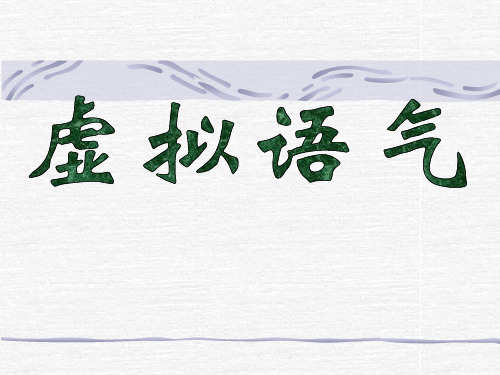
(四)虚拟语气在主语从句中的应用 1.主语从句中的虚拟语气主要取决于某些 形容词和过去分词,用来表示建议、命 令、要求、惊异和失望等。其形式为: (should)+ 动词原形。
常这样用的形容词有: appropriate, advisable, better, desirable, essential 精华的 imperative 迫切 的,important ,insistent ,natural, necessary, preferable 优越的,较好的 strange ,urgent, vital 极其重要的
但as if (as though) 后的从句也常用陈述语气,这是因 为从句中的情况往往是可能发生的或可被设想为真实 的。
3.in order that , so that, 其谓语may, might ,can, could + 动词原 形
The teacher spoke slowly in order that the students could hear clearly.
C. do; be set
B
D. had done; must be set
B 2. Mother suggested that I ____ my homework first before watching TV.
A. did B. do C. shall do D. have done
3. My suggestion was that the meeting ____ off still next week. A. to put B. be putting
与将来事实相反:
条件从句为:1.谓语用动词过去式
2.谓语用were to + 动词原形
什么是虚拟语气
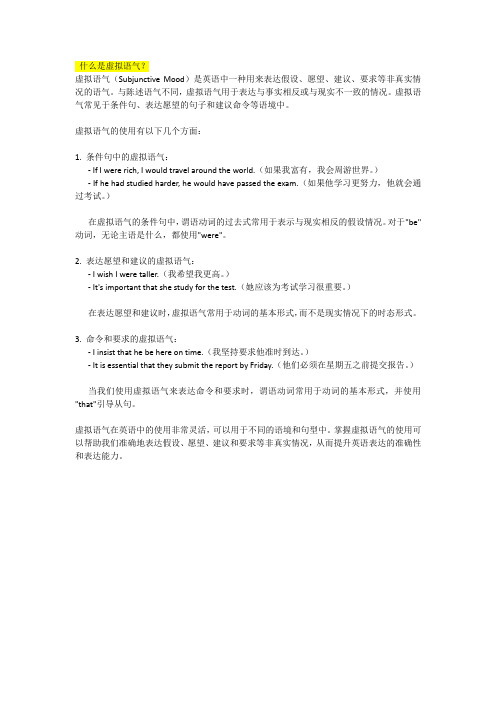
什么是虚拟语气?虚拟语气(Subjunctive Mood)是英语中一种用来表达假设、愿望、建议、要求等非真实情况的语气。
与陈述语气不同,虚拟语气用于表达与事实相反或与现实不一致的情况。
虚拟语气常见于条件句、表达愿望的句子和建议命令等语境中。
虚拟语气的使用有以下几个方面:1. 条件句中的虚拟语气:- If I were rich, I would travel around the world.(如果我富有,我会周游世界。
)- If he had studied harder, he would have passed the exam.(如果他学习更努力,他就会通过考试。
)在虚拟语气的条件句中,谓语动词的过去式常用于表示与现实相反的假设情况。
对于"be"动词,无论主语是什么,都使用"were"。
2. 表达愿望和建议的虚拟语气:- I wish I were taller.(我希望我更高。
)- It's important that she study for the test.(她应该为考试学习很重要。
)在表达愿望和建议时,虚拟语气常用于动词的基本形式,而不是现实情况下的时态形式。
3. 命令和要求的虚拟语气:- I insist that he be here on time.(我坚持要求他准时到达。
)- It is essential that they submit the report by Friday.(他们必须在星期五之前提交报告。
)当我们使用虚拟语气来表达命令和要求时,谓语动词常用于动词的基本形式,并使用"that"引导从句。
虚拟语气在英语中的使用非常灵活,可以用于不同的语境和句型中。
掌握虚拟语气的使用可以帮助我们准确地表达假设、愿望、建议和要求等非真实情况,从而提升英语表达的准确性和表达能力。
- 1、下载文档前请自行甄别文档内容的完整性,平台不提供额外的编辑、内容补充、找答案等附加服务。
- 2、"仅部分预览"的文档,不可在线预览部分如存在完整性等问题,可反馈申请退款(可完整预览的文档不适用该条件!)。
- 3、如文档侵犯您的权益,请联系客服反馈,我们会尽快为您处理(人工客服工作时间:9:00-18:30)。
1,什么是虚拟语气
既然是“虚拟”,说明描述的这件事情未必发生或者几乎没有发生的可能性。
那么对现在、过去、将来的虚拟就分别表示描述的事情在现在、过去、将来未必发生或者几乎没有可能发生。
虚拟语气常见于条件状语从句、主语从句、宾语从句中。
2,虚拟语气的句式结构(动词的变形)
①,If条件状语从句中的虚拟语气
虚拟语气在含蓄条件句中的应用,可参照上表来处理。
做题时只需要将含蓄条件转化成if条件句即可。
例:Without your help,we couldn’t have finished the work ahead of time.
= But for your help, we couldn’t have finished the work ahead of time.
= If you had not helped us, we couldn’t have finished the work ahead of time. (对过去的虚拟)
②,wish后面的宾语从句中的虚拟语气
If only+句子=How I wish+ that从句
例:If only I were a bird. = How I wish that I were a bird.(对现在的虚拟)
③,would rather后面的宾语从句中的虚拟语气
④,as if/though从句中的虚拟语气
⑤,在坚持、命令、要求、建议的同根词下的虚拟语气用should+动词原型,且should可以省略。
此类词包括:
一坚持(insist);二命令(order,command);三要求(require,request,demand);四建议(advise,suggest,propose,recommend)以suggest为例:
I suggest that we (should) take a rest. (虚拟语气)
My suggestion is that we (should) take a rest. (虚拟语气)
It is suggested that we (should) take a rest. (虚拟语气)
注意:suggest作“表明;暗示”,insist作“坚持说”时,不用虚拟语气。
⑥,目的状语从句中的虚拟语气
在in case,for fear that,in order that,so that等引导的目的状语从句中,用“could/should/might/would + do”表示虚拟。
例:They left early for fear that they would miss the bus.
⑦,在It is (high) time (that)...句型中,that从句用should(不能省略)+do或did/were表示虚拟。
It is (high) time that we should take an action.
It is (high) time that we took an action.。
